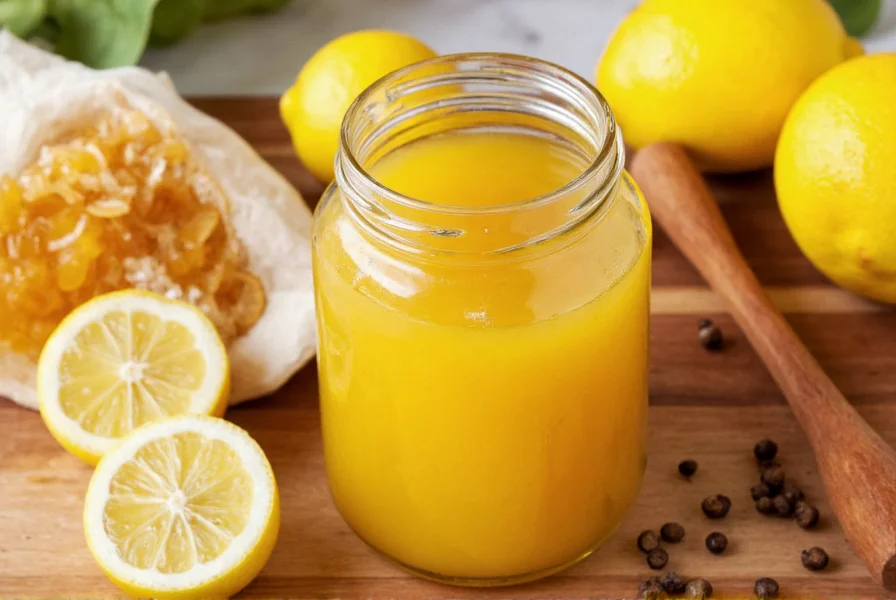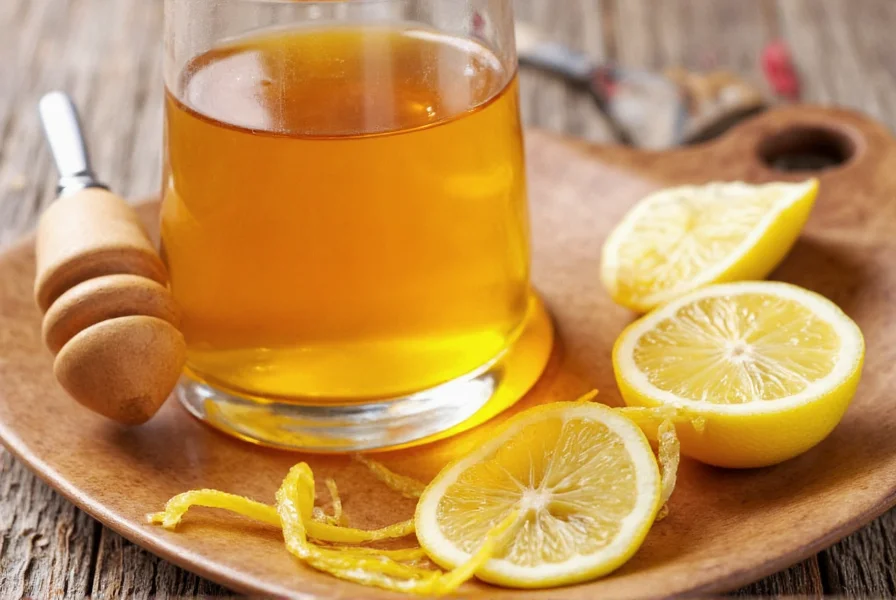Honey lemon pepper sauce has become a staple in modern fusion cuisine, bridging traditional Asian cooking techniques with Western flavor preferences. Unlike many store-bought sauces loaded with preservatives, the homemade version offers superior freshness and customizable heat levels. Chefs appreciate its ability to transform simple ingredients into restaurant-quality dishes with minimal effort.
Understanding Honey Lemon Pepper Sauce Components
The magic of this sauce lies in its carefully balanced components. Each ingredient serves a specific purpose in creating the signature sweet-tart-spicy profile that makes it so versatile in cooking.
Essential Ingredients and Their Roles
- Honey - Provides natural sweetness that caramelizes beautifully during cooking. Raw honey maintains more flavor complexity than processed varieties.
- Fresh Lemon Juice - Delivers bright acidity that cuts through richness. Bottled juice lacks the vibrant flavor of freshly squeezed.
- Freshly Cracked Black Pepper - Contributes both heat and aromatic complexity. Pre-ground pepper loses potency quickly.
- Garlic and Ginger - Common supporting ingredients that add depth without overpowering.
- Soy Sauce or Tamari - Adds umami and saltiness, balancing the sweet and sour elements.
| Sauce Component | Function | Substitution Options |
|---|---|---|
| Honey | Sweetness, glaze formation | Maple syrup, brown sugar syrup |
| Fresh Lemon Juice | Acidity, brightness | Lime juice, yuzu juice |
| Fresh Black Pepper | Heat, aromatic complexity | White pepper (milder), Szechuan peppercorns |
| Soy Sauce | Umami, saltiness | Coconut aminos, tamari |
Perfect Homemade Honey Lemon Pepper Sauce Recipe
Creating authentic honey lemon pepper sauce requires attention to ingredient quality and proper technique. This tested recipe yields approximately 1 cup of sauce with the ideal sweet-tart-spicy balance.
Ingredients for Homemade Honey Lemon Pepper Sauce
- ½ cup raw honey (local if possible)
- ¼ cup freshly squeezed lemon juice (about 2 medium lemons)
- 2 tablespoons low-sodium soy sauce or tamari
- 1 tablespoon rice vinegar
- 1½ teaspoons freshly cracked black pepper (coarse grind)
- 2 cloves garlic, minced
- 1 tablespoon fresh ginger, grated
- 1 tablespoon water (for consistency adjustment)
Step-by-Step Preparation
- Combine honey, lemon juice, soy sauce, and rice vinegar in a small saucepan
- Whisk over medium-low heat until fully incorporated (2-3 minutes)
- Add minced garlic and grated ginger, stirring constantly for 1 minute
- Remove from heat and stir in freshly cracked black pepper
- Cool to room temperature before using (sauce thickens as it cools)
- Adjust consistency with water if needed for your application
This homemade honey lemon pepper sauce recipe creates a more complex flavor profile than commercial versions. The key to success is using fresh ingredients and adding the pepper after removing from heat to preserve its volatile aromatic compounds.

Optimal Food Pairings for Honey Lemon Pepper Sauce
Understanding what foods go well with honey lemon pepper sauce transforms ordinary meals into culinary experiences. The sauce's balanced profile makes it remarkably versatile across protein types and cooking methods.
Protein Pairings
- Chicken - Works exceptionally well with baked, grilled, or air-fried chicken. Try marinating chicken thighs for 30 minutes before cooking for maximum flavor absorption.
- Shrimp - The delicate sweetness of shrimp complements the sauce's citrus notes. Toss cooked shrimp in warmed sauce just before serving.
- Tofu - Pressed extra-firm tofu soaks up the sauce beautifully. Pan-fry tofu cubes first for better texture before adding sauce.
- Salmon - The richness of salmon balances perfectly with the sauce's acidity. Brush on during the last 5 minutes of cooking.
Creative Culinary Applications
Move beyond basic dipping sauce applications with these professional chef techniques for how to use honey lemon pepper sauce in innovative ways:
- Glaze - Reduce sauce by 30% for a thicker consistency ideal for brushing on proteins during the final cooking minutes
- Dressing base - Whisk with additional lemon juice and olive oil for vibrant salad dressings
- Stir-fry component - Add during the final minute of cooking to preserve fresh flavor
- Dipping sauce variation - Mix with Greek yogurt for a creamy dipping option
- Grain bowl enhancer - Drizzle over quinoa or rice bowls for instant flavor upgrade
Honey Lemon Pepper Sauce vs Similar Condiments
Understanding the differences between honey lemon pepper sauce vs teriyaki and other similar sauces helps home cooks make informed choices for specific recipes.
While teriyaki sauce relies on a soy sauce and sugar base with minimal citrus, honey lemon pepper features lemon as a primary flavor component. The black pepper element creates a distinctive heat profile that sets it apart from sweet and sour sauce, which typically uses vinegar and ketchup as its acid components.
Unlike many bottled sauces that contain corn syrup and artificial flavors, authentic honey lemon pepper sauce uses simple, recognizable ingredients. This makes it particularly appealing to health-conscious cooks seeking natural honey lemon pepper sauce alternatives.
Storage and Shelf Life Guidelines
Proper storage is essential for maintaining the quality of your best way to store honey lemon pepper sauce. When stored correctly in an airtight container:
- Refrigerator: Keeps for 2-3 weeks
- Freezer: Maintains quality for 2-3 months in ice cube trays, then transferred to freezer bags
- Room temperature: Only safe for 2-3 hours during serving
Always use clean utensils when handling the sauce to prevent contamination. If the sauce develops an off smell, changes color significantly, or shows mold, discard it immediately.

Common Mistakes to Avoid
Even experienced cooks can make errors when preparing honey lemon pepper sauce. Watch for these pitfalls:
- Using bottled lemon juice - Lacks the bright, complex flavor of fresh lemons
- Adding pepper while cooking - High heat diminishes pepper's aromatic compounds
- Over-reducing the sauce - Creates an overly thick, sticky consistency
- Using low-quality honey - Many commercial honeys contain added sugars
- Not balancing flavors - Taste and adjust ratios before finalizing
Expert Tips for Perfect Results Every Time
Professional chefs recommend these techniques for making perfect honey lemon pepper sauce from scratch:
- Warm honey slightly before measuring for more accurate volume
- Use a microplane for ginger to extract maximum flavor without fibrous bits
- Add a pinch of red pepper flakes for additional heat complexity
- Let the sauce rest for 30 minutes after preparation for flavors to meld
- For restaurant-style presentation, reduce sauce until it coats the back of a spoon
Frequently Asked Questions
Can I make honey lemon pepper sauce without soy sauce?
Yes, you can create a soy-free version by substituting coconut aminos or simply increasing the salt content slightly while maintaining the liquid balance. For a completely different profile, try using mushroom broth concentrate for umami depth without soy.
How can I adjust the sweetness level in honey lemon pepper sauce?
To reduce sweetness, increase the lemon juice ratio while maintaining the overall liquid balance. For less sweet versions, use 2:1 honey to lemon juice ratio instead of 3:1. To increase sweetness without making the sauce cloying, add the honey gradually while tasting, and balance with additional acid if needed.
What's the difference between honey lemon pepper sauce and Chinese lemon chicken sauce?
Traditional Chinese lemon chicken sauce typically contains vinegar, ketchup, and sometimes food coloring, creating a brighter orange hue and more pronounced sweet-sour profile. Honey lemon pepper sauce features honey as the primary sweetener, fresh lemon juice for acidity, and freshly cracked black pepper as the signature element, resulting in a more sophisticated, less artificial flavor profile.
Can I use honey lemon pepper sauce as a marinade?
Absolutely. Honey lemon pepper sauce makes an excellent marinade for chicken, shrimp, and tofu. For best results, marinate proteins for 30-60 minutes (no longer for acidic marinades with seafood). Reserve some fresh sauce for serving to avoid cross-contamination from raw meat.
Why does my homemade sauce separate?
Sauce separation typically occurs when ingredients aren't properly emulsified or when the sauce cools too quickly. To prevent this, ensure you whisk vigorously while the sauce is warm, and avoid refrigerating it immediately after preparation. If separation occurs, simply reheat gently while whisking to recombine the ingredients.











 浙公网安备
33010002000092号
浙公网安备
33010002000092号 浙B2-20120091-4
浙B2-20120091-4